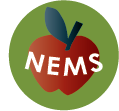Nutritional Environment Measures Survey
The NEMS Tools are observational measures to assess the community and consumer nutrition environments in food outlets, specifically stores, corner stores and restaurants. The measures focus on availability of healthful choices, prices and quality.
NEMS RESTAURANT MEASURES
Assessments of nutrition environments at restaurants focus on eight types of food indicators: healthy main dish choices (low-fat, low-calorie, healthy main dish options), availability of fruits and vegetables without added sauce, whole grain bread and baked chips, beverages, children’s menus, signage and promotions, facilitators and barriers to healthy eating, pricing, and accessibility.
The NEMS-R tool has been updated since its original publication. The original published version of the instructions and the restaurant measures can be accessed by clicking on this link: NEMS-R survey and instructions. The updated version of the NEMS-R tool has an expanded kid’s menu.
NEMS STORE MEASURES
There are 11 measures of store nutrition environments which assess the availability and pricing differences between healthier and less-healthy options: milk, fresh fruits and vegetables, ground beef, hot dogs, frozen dinners, baked goods, beverages (soda/juice), whole grain bread, baked chips, and cereal.
The NEMS-S tool has been updated since its original publication. The original published version of the instructions and the store measures can be accessed by clicking on this link: NEMS-S survey and instructions.
The updated version of the NEMS-S tool has an added measure of cereal as well as some changes to the layout.
NEMS CORNER STORE MEASURES
The NEMS Corner Store survey assesses the nutrition environments, specifically in corner stores. While similar to NEMS-S, NEMS-CS also measures canned and frozen fruits and vegetables as well as additional snack and beverage items commonly found in corner stores.
See a table of the differences between the NEMS-CS and the NEMS-S tools.
NEMS VENDING TOOL
The NEMS-Vending assessment tool assesses the availability of healthier food and beverage options in vending machines.
On January 26, 2012, Carol Voss of the Iowa Department of Public Health and Susan Klein of Iowans Fit for Life presented on Iowa’s experiences in using the NEMS vending machine assessment tool and its website development and how their project was leading to policy and environmental change in Iowa.
*As of February 2020, the NEMS-V website is down. We have added the resources and tools to nems-upenn.org, courtesy of the Iowa Department of Public Health.
NEMS-P
The Perceived Nutrition Environment
Dr. Glanz and staff have developed a survey on the perceived nutrition environment (NEMS-P). Unlike other NEMS tools, NEMS-P is not an observational measure – it is an instrument to evaluate the perceived nutrition environment.
Survey items cover the following constructs: community nutrition environment, consumer nutrition environment, home food environment, food shopping behaviors, eating behaviors, and background characteristics.
NEMS – Grab and Go
Brian Lo and other collaborators from Canada have published NEMS-GG, an audit tool assessing food outlets that sell grab and go foods around a University setting. The instructions are embedded in the tool so there is not a separate protocol. If you have specific questions related to the tool, you will need to email Brian Lo, brianlc.lo@alum.utoronto.ca.
Adaptations and Modifications
We encourage you to adapt and modify the tools as needed to meet the specific goals of your project or research. We ask that you give us or the tool developer credit by citing the specific journal article related to each tool if you do publish or present your work. We also hope that you will share with us any changes to a tool that you do, so we can share it with others.
